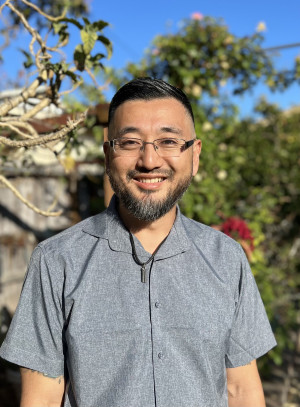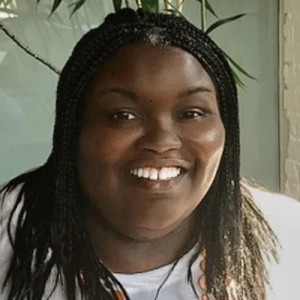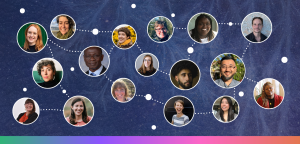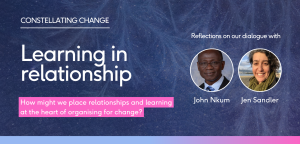This thought piece is part of a series sharing key insights from Constellating Change, our 2023/24 learning and practice series that shone a light on the dynamics and patterns of organising for systems change. It is written by Sean Andrew, Learning and Practice Partner Lead at the School of System Change.
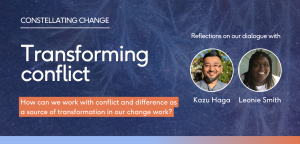
This session invited two old-time friends and colleagues Leonie Smith and Kazu Haga to open up their ongoing dialogue about transformative conflict. Both Kazu and Leonie shared how working with difference can enable the ways in which we organise for change. By building our individual and collective capacity to work productively with conflict, we can sew the seeds of new systems of restoration that support healing and different ways of being and collaborating together.
When exploring the conflicts percolating our organisations, we might be tempted to jump right in by asking: "What conflicts are you experiencing?" Our conversation floated an alternative question: "How do you experience surfacing conflicts in your organisation?" This entry point can take the heat out of conversations about conflict by looking at the ‘how’ rather than the ‘what’. It helps to bring in the range of personal histories in the room, and uncover what is supportive and undermining in our group dynamic. A ‘simple’ question like this can help to form a culture of attentiveness where we’re more aware of our own and each other's contexts, so that we become more able to work with difference as a healthy, natural experience.
For Leonie and Kazu this is their wheelhouse.
Meet Our Contributors
Conflict With Conflict
“Conflict is the spirit of the relationship asking itself to deepen.” - Malidoma Some
As we might see and learn from living systems, a release phase of things falling apart is an essential part of creating the conditions for renewal and re-organisation. Things sometimes need to fracture and open up for new life, or ways of being together, to be born.
Kazu shared how this feeling of unravelling can put people on edge, especially when there are power imbalances. We have lost the habit of being in the trouble together. Modern forms of dominance and ‘power-over’ do not allow for the potential of transformative conflict where relationships can deepen and we can forge futures that work for all.
Instead, a ‘No’ or even a different view is seen as a binary of either/or, as opposed to both/and more, and a problem to be fixed. This gets to the heart of perhaps one of the greatest challenges we face today – a depleted capacity for nuance and ambiguity, and a culture of escalation where debate instead of dialogue is default. A winner and a loser. A zero sum game.
Welcoming a culture of difference or dissent requires practice and capacity in the system, which is difficult to create within the structures of historical and current systems of oppression and trauma.
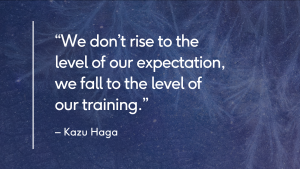
The Practice of Being in the Trouble Together
Kazu and Leonie brought experience of working with conflict from two different angles.
Kazu’s work in nonviolence and social change reminded us that working with our soma, the body, is an essential route to noticing and processing conflict within ourselves and between us. When our bodies go into panic, we lose nuance and empathy. The part of our brain that is responsible for understanding, nonviolence and relationality goes out the window.
So how might we slow down in the face of urgency, to feel and observe what is happening inside of us? According to Kazu, we must learn how to breathe and feel as the world is burning. This way we can respond and not just react. This requires training and places to practice together.
“Slow is smooth and smooth is fast.” - Kazu Haga
Leonie has extensive experience working with non-violent communication with people of colour and those that have experienced structural and cultural discrimination. She explained that conflict will inevitably touch wounds that extend beyond the immediate interpersonal conflict at hand, such as repeated systemic violence and supremacy.
The first step towards transforming conflict is to build our capacity to be with many things at once: to know our own feelings, needs and requests of others, while being fully with the moment, while holding our larger context. To hold all these experiences equally valid. This is easier said than done, especially where there are structural power imbalances, where harm has been done or more intangible needs are marginalised.
Both Leonie and Kazu expressed a need to develop transformative conflict systems in our organisations so they can be places to practice being in difficulty together: allowing it to feel more ‘normal’ to experience conflict, to be able to ascertain what we need in the moment and express what we want of others – all the while stumbling and fumbling along the way with grace and forgiveness for one another and self.
The Capacity of the ‘System'
While it’s tempting to prefigure the future we hope for, this is a fallacy. There is trauma in the system and it heals at the speed of one relationship, conflict, conversation and material change at a time. When conflict is inevitable, how might we, in our microcosms, build our capacity to be with it?
Part of working with the capacity of the system is noticing where the limit is and what is safe enough to try. People need ongoing support and accompaniment with this. Sometimes going into conflict is not safe and people need to exit. As Kazu and Leonie shared, we have no idea how much history and experience can come up while encountering a difficult moment. It can vary dramatically from person to person. We also cannot always rely on the structures in place (e.g. a healthy process of feedback in an organisation) to provide the capacity to be with conflict. And so the burden cannot be put on the person nor the structure or process.
Then how do we work with the capacity of the system? For Kazu, one way in is to amass inner power rather than only trying to dismantle and harness external power. We can learn to burn our own wood. However, this is not for the individual to do alone, and it happens when we have the space and safety for ongoing relational exchanges where we can practice and train to be in the trouble together.
Learning and Practice Invitations
- Invite dissent: Try starting every meeting, workshop or general gathering with explicitly inviting in dissent upfront when you begin. See if/how this opens up the door for folks to bring in difference in a healthier supported way.
- Emotional support and conflict facilitation system: Don’t wait for conflict to happen to figure out how you and your organisation will be with it. Based on the work of Karl Steyaert see if you can develop a system in your team/organisation for working with tensions. It might look something like this…
- Self-Connection: Take time and space to bring more awareness to what is coming up for you internally.
- Empathy: Ask a third party for empathetic listening support to hear you. Be clear if you want mirroring, feedback, advice or just silent listening.
- Conscious Dialogue: Invite a direct dialogue to a) express what is important to you and b) have the essence of what you’ve said reflected by the other person to your satisfaction; and c) make offers/requests to serve a mutually satisfying way forward.
- Supported Dialogue: Dialogue with third party support. This 3rd person offers their presence as need to support reconciliation
- Group process: If you see it as important for multiple members of community to be present to address conflict, ask to initiate a group process such as a restorative circle with a facilitator from either the team or outside, depending on who can bring a degree of multi-partiality and the skills to host.
- Starting meetings with tensions and appreciations: Alternate team meetings by starting with either words of praise (appreciations) or tensions (unmet needs/conflicts) as a way to develop individual and collective ability to openly share what is moving through folk. This practice creates tight feedback loops by “washing the dishes along the way” to catch things early on and also puts “moisture on the ground” via appreciations so that when a spark is lit there is some water to dampen the flame.
- Intra and inter-personal feedback: Use a system like the Pendleton approach when giving/receiving feedback to allow people to self-reflect and share before receiving input from others. This can be supportive in catching tensions early on by allowing people to name and own what they’re already aware of in themselves, which can create ease for everyone involved.
- Self-regulating: Bring in guidance for people to learn about their own conflict style and how to self-regulate in tenuous moments.
Deeper Dive Resources
- Blog: Keguro Macharia, ‘Difference: An Audre Lorde Archive’ (2017). Published by The New Inquiry.
- Zine: The Fierce Vulnerability Network, ‘Fierce Vulnerability Zine’ (2018). Published by the Fierce Vulnerability Network.
- Wiki: Reinventing Organizations, ‘Conflict Resolution’ (date unknown). Published on the Reinventing Organizations Wiki.
- Handbook: The Embodiment Institute, ‘Conflict Resolution Workbook’ (2021). Published on The Embodiment Institute website.
- Article: Shawn Ginwright, ‘Healing-Centered Leadership: A Path to Transformation’ (2022). Published by The Non-Profit Quarterly journal.
- Organisation and approach: Lewis Deep Democracy
- Article: Diane Musho Hamilton, ‘Calming your Brain during Conflict’ (2015). Published by Harvard Business Review.

Written by Sean Andrew
If you're interested in bringing this learning into your organisation or network, get in touch with Sean, our Learning and Practice Partner Lead. To keep inquiring with us as we explore more themes, subscribe to the School newsletter for systems change insights, inspiration and resources.



